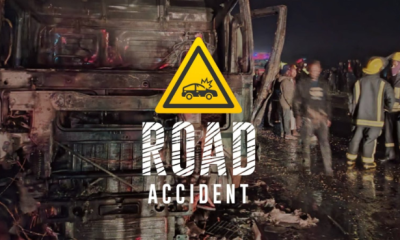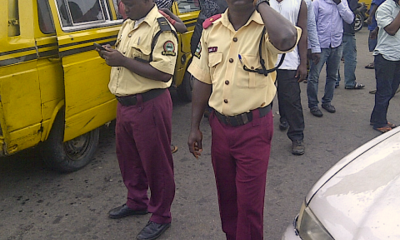Road Safety / Heavy Vehicle Awareness
Nigeria’s Speed Crisis: How Over 18,000 Road Crashes Could Be Prevented

The Race Against Death
On a typical morning along the Lagos–Ibadan Expressway, commuters weave between heavy-duty trucks, buses overloaded with passengers, and cars that treat speed limits like mere suggestions. The honking, swerving, and occasional screech of brakes paint a vivid picture of Nigeria’s most dangerous habit on the road: overspeeding.
Also Read: Overspeeding and Deplorable Roads: A Deadly Mix on Nigeria’s Highways
According to the National Bureau of Statistics (NBS), speed violations were responsible for more than 18,000 road crashes between 2020 and 2022. These crashes claimed thousands of lives, disrupted countless families, and drained the economy of billions in healthcare costs, lost productivity, and vehicle damage.
But the bigger tragedy? Most of these accidents were preventable.
This investigative report dives deep into Nigeria’s speed crisis: the cultural roots, weak enforcement, infrastructural gaps, and the solutions that could finally slow the country down to safety.
The Numbers Behind the Crisis
The NBS data is stark:
- Between 2020–2022, Nigeria recorded over 33,000 road traffic crashes.
- Of these, speed violations alone caused more than 18,000 crashes – that’s over 55% of all incidents.
- In the same period, more than 15,000 lives were lost, with many more suffering lifelong injuries.
Comparatively, Nigeria has one of the highest road traffic death rates in Africa, with about 21.4 deaths per 100,000 population, according to the World Health Organization (WHO).
For context:
- South Africa records about 25 deaths per 100,000.
- Kenya sits at 28.2 deaths per 100,000.
- Developed countries like the UK record just 2.9 deaths per 100,000.
These statistics underscore a troubling reality: while speeding is a global issue, in Nigeria it is both rampant and deadly.
Why Nigerians Speed
Understanding why drivers consistently push the pedal beyond safe limits requires examining a mix of cultural, economic, and systemic factors.
1. Cultural Acceptance
In many parts of Nigeria, speed is associated with confidence, masculinity, and even skill. Bus drivers often boast about how quickly they can complete inter-state trips, while private drivers equate speed with prestige or control.
2. Economic Pressure
Commercial transport operators, from danfo buses to interstate luxury coaches, make more money the faster they complete trips. For them, overspeeding isn’t just recklessness – it’s survival in a competitive market.
3. Poor Enforcement
Although the Federal Road Safety Corps (FRSC) sets speed limits, enforcement is inconsistent. Checkpoints are few and far between, and technology like speed cameras is largely absent from Nigerian highways.
4. Road Infrastructure
Ironically, even poor road conditions encourage speeding. Where highways are well-paved (such as portions of the Abuja-Kaduna road), drivers often accelerate beyond control. On poorly maintained roads, drivers try to “beat the bad spots” at high speed before losing control.
The Human Cost: Stories from the Road
Behind every statistic is a family torn apart.
Case 1: The Lagos–Ore Tragedy
In December 2022, a bus traveling from Lagos to the East lost control after overspeeding and colliding head-on with a truck near Ore. Fourteen people died instantly. Survivors recounted how the driver ignored repeated pleas to slow down.
Case 2: Abuja–Lokoja Nightmare
In April 2023, a speeding trailer carrying cement overturned near Lokoja, crushing several smaller vehicles. Eyewitnesses said the driver had been overtaking recklessly at dangerous curves.
Case 3: Everyday Losses
In Lagos, 26-year-old Chidera lost his brother in a motorcycle accident caused by a speeding car in Surulere. “He was just coming back from work,” Chidera recalls. “The driver didn’t even stop.”
These are not isolated events – they represent the lived reality of millions of Nigerians who travel daily with a silent prayer on their lips.
Policy and Enforcement: Where Nigeria Falls Short
The FRSC has consistently campaigned against overspeeding. Its policies include:
- Speed limits of 100km/h on highways for cars and 90km/h for buses and trucks.
- Installation of speed limiters in commercial vehicles.
- Nationwide campaigns like “Slow Down, Save a Life.”
However, enforcement remains weak due to:
- Corruption: Some drivers “settle” officers at checkpoints to avoid penalties.
- Low Technology Adoption: Unlike in the UK or UAE, speed cameras are rare on Nigerian highways.
- Weak Penalties: Fines for overspeeding are often too low to deter habitual offenders.
Experts argue that without stronger enforcement, campaigns alone will never change behavior.
Technology: The Missing Piece
Around the world, technology has proven effective in curbing overspeeding:
- Speed Cameras (UK, US, UAE): Automated systems that fine offenders instantly.
- Telematics (South Africa): Insurance companies track driver behavior and adjust premiums.
- Mobile Apps (India): Drivers use GPS-based alerts when exceeding speed limits.
In Nigeria, speed limiters were made mandatory for commercial vehicles in 2016, but enforcement was patchy. Many drivers tamper with or outright remove the devices.
What Nigeria needs is a comprehensive tech strategy:
- AI-powered speed cameras on highways.
- Black box recorders in commercial vehicles.
- Integration of speed data with insurance and licensing systems.
International Comparisons: Lessons for Nigeria
- Sweden: Introduced the “Vision Zero” policy, aiming for zero road deaths. Strict enforcement and public education reduced fatalities by over 50% in two decades.
- United Arab Emirates: Once notorious for speeding, the UAE now has extensive speed cameras and strict penalties, cutting deaths significantly.
- Rwanda: A closer African example, Rwanda introduced speed governors on buses and saw a 26% reduction in accidents within two years.
Nigeria can replicate these successes, but it requires political will, investment in technology, and a cultural shift.
The Economic Cost of Overspeeding
The World Bank estimates that road traffic crashes cost countries about 3–5% of GDP annually.
For Nigeria, with a GDP of about $477 billion (2024), that’s $14–23 billion lost every year to road crashes.
These losses come from:
- Hospital bills and rehabilitation.
- Loss of breadwinners.
- Vehicle and infrastructure damage.
- Insurance claims.
- Reduced productivity from traffic congestion caused by accidents.
If Nigeria reduces overspeeding by even 30%, it could save billions – money that could be reinvested in roads, schools, and healthcare.
The Way Forward: Solutions That Can Work
- Stricter Enforcement: Equip FRSC with speed guns, drones, and cameras.
- Public Awareness Campaigns: Partner with Nollywood, music stars, and influencers to shift the culture around speed.
- Economic Incentives: Insurance discounts for safe drivers; tax breaks for fleets that comply with speed regulations.
- Infrastructure: Better signage, road markings, and speed bumps in urban areas.
- Stronger Penalties: Heavy fines, license suspensions, and even jail terms for repeat offenders.
- Technology Adoption: Nationwide rollout of automated speed monitoring.
Voices from Experts
- Dr. Kayode Oyesola, Transport Economist: “Speeding is not just a road issue; it’s an economic drain. Every life lost is a loss to the economy.”
- FRSC Commander Bisi Kazeem: “We are working on stronger enforcement, but drivers must also take responsibility.”
- Ngozi Eze, Road Safety Advocate: “Until overspeeding is seen as socially unacceptable – like drunk driving in other countries – change will be slow.”
Conclusion: Slowing Down to Save Lives
Nigeria’s speed crisis is more than a traffic issue – it’s a national emergency. With over 18,000 crashes in just three years, the country cannot afford to continue business as usual.
The solutions exist: stronger enforcement, smarter technology, better policies, and cultural change. What’s missing is the collective will from government, private sector, and ordinary citizens to put them into action.
Until then, every journey on Nigerian roads remains a gamble with fate.






















